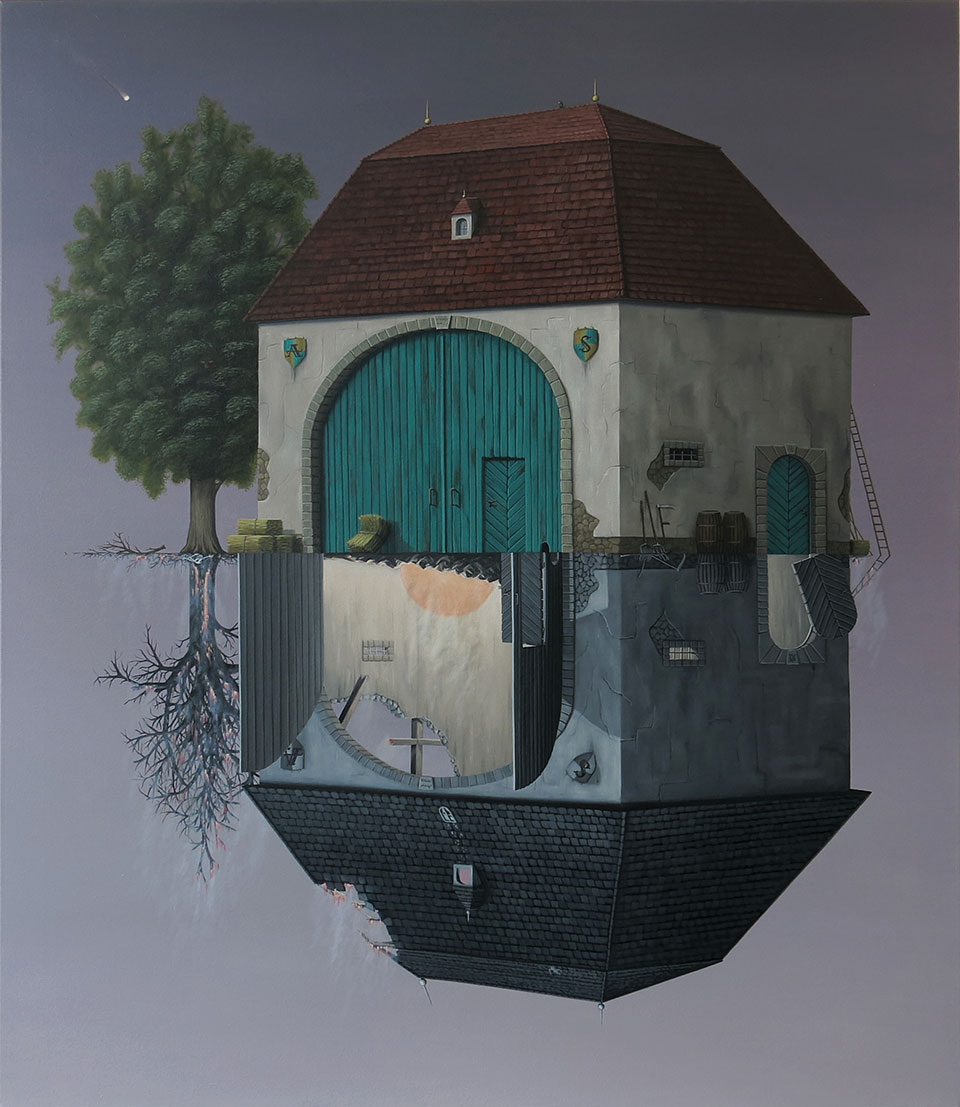The House

A mother inside, a daughter outside. Has her mother shrunk, or has she always been a rectangle?
W
ith age, she has shrunk. Her head has drawn back between her shoulders, her shoulders themselves shifted forward, so much so that now she resembles a narrow rectangle, as flat on top as on the bottom, hardly wider than the space between a pair of double doors ajar.
This fragility worries me. And so I am overjoyed to learn that she is having a house built in her old age. I paid her a visit while it was still under construction. A whole wall was missing on one side. It was spring, and the air came rushing in through this vast opening. Cornered at the far end of the room, she complained about the slowness of construction, the excessive light, the din from birds and workers, the cold. With each of these complaints, I turned for a better look at the cause of the disturbance. In the end, I didn’t see much of her that visit. Mostly I recall that big, exposed space opening on yard and sky.
Cornered at the far end of the room, she complained about the slowness of construction, the excessive light, the din from birds and workers, the cold.
Seized with remorse at this negligence, I go back and see her a bit later. Surprise! The house is finished. I look around front for the way in and can’t find it. I go around the side and can’t find it there either. Then I hear her exasperated voice from far away, as if at the end of a tunnel, saying, “Can’t you see the door? Will you come in already, you’re late as it is!”
I head back around front and spot a sort of overhang, a bit like on a doghouse. I bend over and shout through the narrow opening, “I can’t find the way in!”
“What are you talking about?” she replies, ever more exasperated. “You’re standing right in front of it!”
And just then, I see the door. She’d opened it already and was waiting for me in the hallway behind. I don’t like making her wait, and I rarely question her assertions. She’s so often right.
I’m past the age when my head’s malleable as rubber. No, mine has hardened from contact with life, and I can’t mold it to fit every opening that comes my way anymore.
I bend over to go in but wind up bumping my head on the lintel.
“Look,” I say. “I can’t fit.”
“Just bow down,” she says, as if speaking to a child.
I’d bend over backward for her. So I bow down, I even squat down, I even get on all fours. But my head still won’t fit.
“Look,” I say, “my head keeps hitting the top.”
She is not happy. I can tell she suspects me of not really trying. So I try again; my head smacks the stone lintel. Neither she nor it is willing to give. Abruptly, she loses her temper.
“I always said you were hardheaded, that it would be your downfall! Young people are such ingrates. As if only visiting once a year weren’t bad enough, they come lugging the filthy humps on their backs along with them! Just tuck your head in already!”
Her animosity goes to her head, and now she even adds, “Or throw it away already, just toss it on the leaf pile!”
Meanwhile, it’s starting to rain—an icy rain, it’s winter. I’d like very much to go inside and be warm with her. But I’m past the age when my head’s malleable as rubber. No, mine has hardened from contact with life, and I can’t mold it to fit every opening that comes my way anymore. I switch tactics and turn sideways, hoping what I gain width-wise will help me pass height-wise. No dice. Now my breasts are scraping up against the rock, and if from compassion I flatten them a little, then my butt sticks out. If only I could get rid of these curves? It’d take days of depriving myself and arduous abstinence. That’s not my thing anymore either.
The afternoon’s half over now. I twist, wriggle, writhe—nothing works. Night falls, and anger overtakes me.
“Why did you make the entrance so narrow? You weren’t thinking of me at all, as usual!” I start yelling.
“What? I wasn’t thinking about you?” Her voice reaches me, truly revolted. “I made this house for you, but you won’t bow to convention like everyone else. You just pigheadedly do as you please. For shame!”
For an hour, we howl at each other though the slot like dogs. After all, I can’t ask her to come out to the yard in this icy downpour. Besides, she’s already retreated to the depths of the dwelling, and her voice reaches me only faintly.
Nonetheless, I come back next time. Alas, my head is still my head, and all the rest. I make do with talking to her through the slot. The interaction is lacking in closeness. Each time finds her a bit farther down the hall, since she suffers from the cold. Soon I can’t see her anymore. When she falls ill, she’s stuck so far back I can’t even reach her with my hand to comfort her. Her reproaches are the hardest part. She keeps saying I’m not in compliance with the doorway, and what can I say? She’s not wrong.
And so, year after year, I watch her waste away in the depths of a corridor I cannot enter.
And so, year after year, I watch her waste away in the depths of a corridor I cannot enter. It poisons my life; no joy I feel is whole. And yet whenever it’s time again, I come and station myself right in front of that rectangular slot. I do it more for me than her, since she can’t hear me anymore.
Once, while stationed there, I started asking myself a few questions. Such as: has she ever in fact had a head, a butt, or breasts? Has she really shrunk, or has she always been that narrow rectangle? All things considered, I’ve never known her any other way.
Suddenly my past sufferings make sense. Alas, none of this keeps me from suffering now, stationed alone before the house she cannot leave and I cannot enter.
Translation from the French by Edward Gauvin












